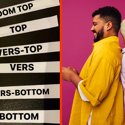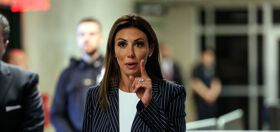
The internet never forgets. And thanks to the power of the social media, things we posted online years ago can resurface at any moment to become the elephant in every room we walk into, sparking belated backlash. Yesterday’s faux pas, once uncovered, can permanently stain your reputation. You may have long forgotten the slip, having filed it under “young and dumb,” but the internet has not.
And so it’s gone with Michael McCauley, the gay plus-size model whose past social media posts have come back to incriminate him just in time to stain Abercrombie & Fitch’s new inclusiveness campaign in which he’s featured. It’s not clear exactly when he made the posts, but at least two of them were on Facebook, and in one, he wrote:
A group called “black lives matter” is blocking the streets downtown and just made me late for a crucial meeting. Thank you for making your point – I’m glad your life matters more than mine.

Social media historians began digging into McCauley’s Facebook past almost as soon as he created his official Twitter account on February 6. Detractors came out in droves in response to McCauley’s March 14 tweet about Queerty’s recent Q&A interview in which he touted the importance of diverse representation. Many screen-grabbed the original Facebook post and several shared a response to a comment under it in which McCauley made yet another damning BLM declaration.
How about we take this to the next level?
Our newsletter is like a refreshing cocktail (or mocktail) of LGBTQ+ entertainment and pop culture, served up with a side of eye-candy.
It’s a group of extremists that don’t really represent the majority of the black community.
Unfortunately, his past public displays of racism don’t end there. In an old video someone posted on Facebook (it appears to have been made during the #OscarsSoWhite boycott of the 2016 award season), he took a time-out to rant about another black movement.
“Jada Pinkett Smith, so, uh, since you’re going to be boycotting the Oscar’s, I’ve decided I’m going to boycott the Grammys because not enough white people are nominated,” McCauley said.
ah, and the saga of "White Guy Problems" continuesconfirmed; dude is (or, ALLEGEDLY, was) a piece of shit.
Posted by Anthony Simpson Jr. on Monday, March 16, 2020
It’s almost like he plagiarized scripts from a cartoon racist. Although he’s guilty of making some of the most unoriginal racist pronouncements known to black people, should he get cancelled and lose his A&F gig and all prospects of a model future over this? Well, that’s up to A&F and casting agents looking for plus-size models. Personally, I’m over “cancel culture.” But people will talk and they’ll judge, and when they’re talking about/judging you, you can either shrug it off or listen and learn.
Regardless of how McCauley and A&F ultimately decide to handle the backlash (he has yet to address it), here are four things we all can learn from this latest retroactive race scandal.
1. You don’t have to think you’re racist to be racist.
Racism is in the eye of the beholder, and McCauley probably wouldn’t self-identify as racist. I mean, who does? He’d probably say something like, “I’m just being honest.”
Newsflash: You don’t have to use the N word in public, march with white supremacists, or attend an alt-right rally to qualify as racist. Little microaggressions, even stuff that might be barely perceptible to the naked eye or ear, can give you away, especially to black people. When you’ve spent your entire life fielding side-eye and being judged by the color of your skin, hitting glass ceilings at work, and living in a society that values white over everything else, you learn how to spot racism.
2. Not every private thought needs to be tweeted or documented on video.
To be human is to be racist to a certain degree. We’re not responsible for the thoughts that cross our mind, but we are responsible for what we do with them. People blocking traffic can be frustrating, even when it’s for a good, legitimate cause. But complaining about in on social media using clever wordplay isn’t about a fleeting thought. It requires concerted effort.
It doesn’t matter if you did it yesterday, last decade, or last century. There may be a statute of limitations on certain crimes, but there’s no statute of limitations on being held accountable for one’s words. Free speech goes both ways, and unless you’re talking to yourself, as soon as you put an idea out there, you have to accept that people will respond and likely judge you for it in perpetuity.
3. Black Lives Matter matters because of the very people who have a problem with it. (And Billie Eilish probably doesn’t think the Grammys are too black.)
First off all, sorry to break the disappointing news, but Black Lives Matter is not and has never been a fringe movement. McCauley would know that if he were qualified to speak for the black community or if he were an informed white person who took black issues as seriously as he does the prejudices overweight people face.
In other words, even if he posted his Black Lives Matter complaint in the earliest days of the movement when someone may have been forgiven for not fully understanding what it stood for, his outright dismissal of it speaks volumes.
4. Those who question a minority group’s proactive measures to achieve equality are as dangerous as those who actively try to undermine that equality.
As long as white people insist that black people just shut up, they pretty much guarantee that we won’t. And dear gay men: It’s not just about you. Every oppressed group seems to think they have it worse than the others. Activism should not be a contest. If current world events have proven anything it’s that we’re all in this together.
If anyone can understand what it’s like to be part of a disenfranchised group, it should be someone from another disenfranchised group–or in McCauley’s case, two of them. Gay men know their lives aren’t as valued by society as straight lives. Overweight people know that as far as casting agents are concerned, thin is always more in.
Is it that hard to understand that blacks are in the same leaking boat? If gay men need special protection, why not blacks? We can’t criticize proponents for Straight Pride while shouting “All lives matter” on the side. More than 50 years after the Civil Rights Movement and Stonewall, it’s time to finally get this right.
Jeremy Helligar is a New York City-based journalist from the U.S. Virgin Islands and the author of the travelogue/memoir Is It True What They Say About Black Men?


















Chrisk
Damn people. The constant outrage is just getting tiring. The PR warriors are really turning them rocks over looking for any hint of not being perfect all the time.
shakes_head
Or you could just not share your ignorant and insensitive thoughts online? Pretty simple solution…
WashDrySpin
WRONG ChrisK…these internet sleuths are turning over rocks and finding RACIST remarks and actions…but maybe you are projecting and worried about someone over turning some rocks and finding your racist past words and/or deeds
michael234
hay
GlobeTrotter
Umm, I’m black and I fail to see the racism here.
It seems to me that today people play the racism card for the slightest affront. Sorry to say but an insult is not the same as racism. Rejection is also not the same as racism. Someone snubbing you is not racism. Neither is indifference or a rebuff.
Somewhere during the past 20 or so years we forgot to teach black people about resilience and how to persevere in the midst of adversity. So someone looks at you the wrong way – so what? So someone doesn’t like the color of your skin? Big deal! As long as they’re not preventing the free exercise of your rights, then they should be ignored. As a matter of fact, the more you acknowledge or engage them, the more they feel confirmed in their prejudices. Just ignore them and carry on.
WashDrySpin
How many times do we as Blacks have to turn the other cheek, ignore and look the other way…Obama as President did that for 8 years as the President of the most powerful nation on the planet and where did it get him NO WHERE….his legacy is being dismantled as a spite filled joke by Trump because he does not like the man…no other reason given nor offered…..my black neck is strained and my resilience is threadbare…how about white people stop acting, speaking and making actions that are clearly and unmistakenly RACIST
radiooutmike
Unfortunately, the social media detectives have only put up what he posted about “black” issues.
We don’t know, if he posts those types of observations about Latinos, women, vegans or whomever annoys him at that moment. It’d be nice to say he just does not self-edit, but I don’t know.
GlobeTrotter
@WashDrySpin, well, I don’t know what to tell you. If you’re that thin-skinned, then I suggest you never move out from your parent’s house. The world is full of people who won’t like you for one reason or another, whether it be your skin color, your eye color, your hair color, your name, your accent, your city/state/country of birth, etc. Without a healthy measure of resilience, you’re always going to find yourself getting offended and bent out of shape over the silliest things – and for what? If those bigots don’t put food on your table and don’t stop you from the free exercise of your rights, then leave them to wallow in their own ignorance. YOU CAN’T CHANGE PEOPLE, only inspire them!
I’ve been living in Europe for the past few years, and if you think racism in America is bad, do yourself a favor and never set food in Europe. The U.S., in comparison, is like a shining beacon of racial harmony. At first, I used to get upset, but nowadays I’ve come to realize that most racist people are simply jealous of my accomplishments and polished demeanor. They wish they were like me, but as this is not possible, they resort to putting me down in order to feel better about themselves. I don’t, however, allow it. I don’t waste my energy getting all bent out of shape over their stupidity as this only serves to validate their bigotry. I ignore them. And trust me, they get the message. A friend once told me, “the greatest insult is to ignore” – he was 100% right!
Years ago after finishing college, my first big job was in the human resources office of a large NY insurance firm. I was nervous as hell! It didn’t help that one of the secretaries was always ignoring me, even when I went out of my way to be polite to her and say “good morning” to her each morning. She always addressed me in a bitchy tone and always rolled her eyes whenever I walked by her desk. So I naturally came to the conclusion that she was a bitter old racist bitch. After a few weeks however, I noticed that she was mean and nasty to EVERYONE, not just me. I came to realize that she wasn’t racist, she was just a very unhappy individual. 2 years later when I was being transferred to Europe, she came up to me on my last day and shocked me by handing me a goodbye Hallmark card. Huh? I thought to myself. She then told me that she’s always admired me since my first day, how neatly I was dressed and how well mannered and politely I spoke to everyone. I was speechless! She very nicely wished me all the best for the future and asked me to drop her a line every now and then.
The moral of the story is, in life you’ll meet the good, the bad and the ugly. You can’t however allow the opinions of other people to define your reality. If you do, you’ll always find yourself getting offended and/or disappointed. It’s far better to believe in yourself and pursue your own goals, regardless of what others think about you.
MeowMixPlusUltra
“As a black man” I honest could not give a rats *** what you think… You are not the emperor of black people. And honestly… a nameless, faceless dude on the internet claiming to be black is nothing new. Plenty of black fish going on. Here’s a hint, you don’t NEED to start a post with “as a black man” blah blah blah. Dead give away honestly. NO ONE is trying to “change him” we don’t give a crap about him. He can crash and burn in his own ignorance till the end of time. He’s trash, and so is anyone defending him. I am so sick of you people, trying to lecture the MAJORITY of black people, about how much racism they are supposed to accept, or not say anything about. We don’t have to “accept” this. Not now, not ever! You “don’t see anything racist” about a white guy, disparaging black people fighting for equality and not being killed by the state, or black people not giving business to entities that ignore their accomplishments constantly… well good for you! No one gives a ****!
GlobeTrotter
“I honest could not give a rats *** what you think…”
You’re pretty vocal for someone who doesn’t care what I think. I think you do, and I think you know that I’m right, and I think it’s burning you up on the inside, hence the drama.
Someone who doesn’t care also doesn’t take the trouble to respond.
Lisa Clarkson
100% blackfish
RomelleRomelle
Just because you are Black and not offended does not mean any other Black person shouldnt feel offended. We all have unique experiences that would make his comments and video have a different effect on how we feel…. To belittle another Black Persons feelings of feeling Offended is Insensitive and reckless….
pharaon.em.joe
@romelle he is not belittling anyone! And where did he say that he is speaking on behalf of all black people? If you want to chime in and share your “opinion”, at least let it be valid.
@globetrotter i want to be your friend.
PLAYS WELL WITH OTHERS
Dam get the popcorn out, sit back this one gonna be a shiitshow!
(I’ll post my thoughts later. 🙂 )
WashDrySpin
1. Lots of the white gay community is racist in that they do not have friends that are diverse in race or ethnicity….just scroll thru even “famous” gays social media accounts you will find few people of color.
2. Many white gay men think because they are gay that absolves them from being racist
3. White gay culture has never addressed/apologized for their treatment of people of color as far as denying them entrance into clubs and other places of “inclusion”
4. Many white gay men only want a person of color if they have prescribed and aspired to clone themselves in mind and definitely body…they will look the other way in regards to skin tone as long as the body is “exactly” like theirs…it is the currency for many in the community.
Lastly, it is sad that Michael does not realize nor accept that long before he embraced and accepted his gayness he was shown, taught and learned to accept and project the racist ways within the white society he grew up in here in America
dmanhart
It would seem YOU are the one filled with racism. White this, white that…. Unclutch your pearls and panties dear.
djmcgamester
Wow, yawn. Does it make a difference that I’ve dated an equal number of POC as white guys?
Reality check. No one is perfect. Your race doesn’t matter. YOU make race matter.
tf3.0
You strike me as someone who gets rejected by attractive White guys, and you are pissed. You simply cannot believe its because you’re physically unattractive, so you blame racism….
This is not racism.
jonasalden
@dmanhart: Nice gaslight! @djmcgamester: No, it doesn’t matter that YOU’VE dated a few POCs (btw, a lame-ass, lazy term). He’s not talking about YOU. Taking offense to someone’s general opinion is either self-centered or suspiciously defensive (Have you done that oft-complained out thing on Grindr yourself?). And @tf3.0: Have you seen WashDrySpin? How do you assume he’s unattractive? Or do you pray to God he is so that you have grounds to dismiss his opinion. You probably have done that thing on Grindr that dgmcgamester wants everyone to think he’d NEVER do, or at least didn’t do a few times. Really the only difference between WashDrySpin and me (I assume we’re both Black) is that I don’t care about what White gay men do because, among other things, it gives you power you don’t deserve just for being the race you are.
Kenny C
@jonasalden Well said sir. These responses remind of that old saying: “throw a rock into a pack of dogs and the hit one will holler.”
Lisa Clarkson
@djmcgamester: No, and it’s kind of gross that you keep count.
Cam
What I’m sick of is authors posting stuff like “Personally, I’m over “cancel culture.” .
There is no such thing as “Cancel Culture”, what is finally happening, is because of social media people are finally getting called out on their actions. If A&F wants to fire him, he isn’t “Cancelled” it’s because they determined he was bad for business. If black people don’t want to buy from a company that hires him, it’s because they don’t like what he said and don’t feel like thinking about him when they shop. Attacking “Cancel Culture” is a right wing deflection to try to protect people getting caught being the racists or bigots they are.
Smith David
I hope I live to see the day when racism is completely eradicated from this earth. As an African American, I am so tired of defending myself. I’m just tired. I hope Michael McCauley gets to keep his job. I do not give a F about this brand or were it’s going. Firing him won’t change anything. The hearts of men are desperately wicked.
Heywood Jablowme
Fat people are supposed to be jolly.
Smith David
Lmao..fact! lol….As a fat guy myself. I can honestly say, I am usually pretty jolly. lol…lol..ooooh boy!
Hussain-TheCanadian
Heywood you b@stard, you made me laugh, how dare you!!!
Jared MacBride
He’s an overweight guy who was lucky to get one modeling gig – why should I care what he thinks about anything?
frapachino
His statements are not racist well maybe to racist they are!
Cam
The most tired right wing troll deflection.
Racism isn’t racist….calling out racism is racist!
(Eye Roll)
Itsonlythetruth
Where are the racist statements the article speaks of? Nothing he said comes even close to racism as far as I am concerned. Wishing him much success in the modeling world.
dmanhart
Part of the hatred against him probably is coming from the fact that he isn’t a skinny ass young twink.
Hussain-TheCanadian
Wasnt Queerty glorifying this man couple of days ago?
I hope the Uturn didn’t give you guys a whiplash over at the “editorial board “.
djmcgamester
A) It’s freaking annoying when your life is disrupted. In an age of social media you should expect a post-before-you-thank reaction.
B) We need to start forgetting. It’s the reason no one knows how to forgive anymore.
Kangol2
“We” forgot George W. Bush and ended up with an imbecilic sociopath 1,000 times worse. “We” forgot the lessons of history and now the globe is falling apart as a dizzying rate. Maybe instead of “forgetting” and burying heads in the sand we confront people in real time and deal with crap, because just tossing it to the side rarely if ever makes things better, especially when it comes to racism, homophobia, sexism and misogyny, or anything else like this.
djmcgamester
Screw microaggressions. When you say racism is in the eye of the beholder you’re basically saying “whatever I feel is reality so you’re racist if I say you’re racist – even if yesterday it didn’t bother me”.
I do believe every private thought doesn’t need to be put out there. Welcome to the world of social media if you’re just finding out this is a reality. I’ve dropped my social media accounts because *I* was doing that behavior and realized it wasn’t helpful. It burned bridges rather than build them.
Cam
What they are saying is that a white person doesn’t get to say “That’s not racist” when confronted by a group of a thousand black people or latinos etc.. saying “Um, yes, that’s racist”.
nitejonboy
Great, makes us gay plus size guys look bad, way to go azzhole.,and I don’t get why he has a contract with A&F, the largest size they sell is 2x, hardly plus size if you ask me..that’s the size of most beefy frat boys nowadays.
jonasalden
As for Michael McCauley, he must know deep down that being White hasn’t helped his desirability at all, although he might think it should’ve. There’s nothing special about his face at all. My guess he was chosen because he’s fat and they wanted to make a statement. At least Lizzo can sing well and play the flute!
Cam
They didn’t chose a black guy who was heavier for the campaign. And A&F has been accused of avoiding black models multiple times in the past.
bftlguy
Well he is gay and also plus sized and had had the good fortune to be selected to participate in an Abercrombie & Fitch ad campaign as the company tries to remake their image as one of inclusivity. I think most people know that what you post on the Internet is forever so a quick search of Pop n Fresh’s past web activity find 3 comments that if not outright racist offerings show a lack of understanding of institutional racism in the US and an indifference to trying to explore why BLM is ruining his day with their protests. Then he pops off at Jada Pinkett Smith for her frustration with the lack of diversity in nominees for the Academy Awards, something clearly noticeable to even a casual observer. Again instead of putting any real thought into how this makes she and other people of color feel he fires back with some comment implying the Grammys are overrepresented with black talent. (He doesn’t seem to understand that the Grammy’s have a slew of categories outside the five or so Pop categories.) These lame comments demonstrate he is not very bright and blind to his role as a person bringing inclusivity to Abercrombie & Fitch. Racist? Absolutely! The “all lives matter” bs comes from the same bigoted part of the brain where geniuses decide “Why don’t we have straight pride?”
demetheus
For fks sake, you cancel culture warriors need to get off your high horse. People say things and from his posts I can see he’s trying to be better
Seriously trying to pull someone down when they got lucky is disgusting. So what, Micheal is not supposed to get any job to feed himself now?
demetheus
And I see a few people here call him just another fat model. Omg should they lose their jobs too???
MeowMixPlusUltra
STFU…. you trash racists need to get off your high horses. Why are you people the only ones that seem to struggle with this? How is it, that I and many other have been able to go out entire lives without being racist garbage, but we are expected to show sympathy for stupid P’OS who spend YEARS being RACIST!?!
No one is pulling him down because he “got lucky” they are refusing to buy a single thing for a company he is employed by. Honestly, he can kiss my ***. And so can you!
Cam
What the right wing trolls don’t seem to fathom is that to avoid being “Cancelled” is pretty easy. Don’t run around spewing racism/bigotry/attacks on women.
It’s the fact that they become enraged at being asked to do that one thing is very telling.
saintST3PH3N
people are being held accountable for the f’d up things they say IN PUBLIC and can’t handle it. hah. suck it up, snowflakes! all this whining about “PC and cancel culture gone too far.” please. what you’re really saying is, “i’m no longer free to spew my bigoted, hateful b.s. in public without pushback and that makes me SAD.” boo-f’king-hoo. and to be clear, no one is actually stopping you from saying/posting all the shitty things you think/feel. but if you’ve got the stones to put it out there, have the stones to deal with the repercussions. jeez. “accountability,” hon. look it up.
Cam
mic drop
Kenny C
Its so frustrating. Majority of these responses fail to even attempt to ask or try to understand a different prospective from their own. Yes the statement is racist. Yes it is hurtful that he ignores the point behind Black Lives Matter, trying to bring attention and justice for systemic police violence against people of color. Instead, the black perspective is dismissed as causally as a paper bag. This is why I say being black and gay in this nation analogous to a motherless child. The black community, by and large, won’t stand for my gayness. The gay community, by and large in my experience, won’t stand for my blackness. This guy and most of the comments on this thread re-enforce my perspective.
truckproductions
anyone who’s actually met this fool knows the story is spot on.. he’s such a douchebag. His ego is absurdly high but it clearly covers a very insecure child. Glad he’s being exposed.
LumpyPillows
I’m kind of tired of Queerty deleting posts. Consider me gone.
rnormfoto
“Not every private thought needs to be tweeted or documented on video.”…EXACTLY. Good advice for everyone.
usesomebody
People are mad that his racism is being called out.
Boo hoo
People, black people in particular, are not being too sensitive. Racism is a big deal. People’s bigoted ideas lead to black being counted 3/5 of a person. Black people weren’t allowed to integrate into society, participate in the economy in various ways, hell people even looked the other way when black people were lynched. We shouldn’t let these ideas be acceptable and become collective thought. Some of us don’t want to return to the past. So please consider our history before you start defending racists.